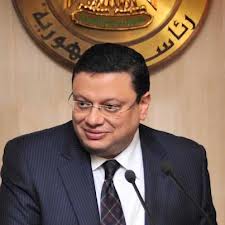The little-known militant group of Lewaa El-Thawra (Revolution Brigade), which claimed responsibility for assassinating a high-ranking army officer on Saturday, has published photos of uniformed items and a gun allegedly belonging to an army personnel member who was present at the assassination.
On Saturday at dawn, the head of the army’s ninth armour division, Major Adel Ragaai, was assassinated in front of his residence in Al-Obour city near Cairo. Gunmen driving a black private car opened fire on Ragaai, his driver, and his personal guard. The attack left two police officers dead and three others injured, as well as two civilians.
Prosecution investigations did not reveal any preliminary findings at the time of print.
Following the attack, Lewaa El-Thawra claimed responsibility for the assassination on its Twitter account. The group stated that Ragaai had been monitored intensively beforehand and was targeted as the major was responsible for blocking tunnels between Egypt and Gaza by submerging them with water.
The group’s statement read: “Following accurate monitoring, a number of our heroes succeeded in killing the criminal Adel Ragaai at dawn on Saturday. Our heroes did not leave [the vicinity of] his residence until they emptied all their bullets into his head.”
The statement continued that the driver and another of Ragaai’s officers were injured and that militants seized the officer’s gun. Full footage of the assassination will be broadcasted soon, according to Lewaa El-Thawra.
Though the group has not declared a clear affiliation, it is believed to be a military arm of the outlawed Muslim Brotherhood group due to the reasons it stated to justify the assassination.
Lawaa El-Thawra also stated that it has previously warned of the frequent violations against Egyptians committed by the regime that ended in the assassination of Mohamed Kamal, a senior leader in the Brotherhood. Kamal, 61, was killed in his residence at the beginning of October during a raid conducted by Interior Ministry forces. Kamal was accompanied by a teacher named Yasser Shehata who was also killed in the incident.
“The mention of Kamal by Lewaa El-Thawra is a clear indication that the group is affiliated with the Brotherhood,” expert on Islamist movements Ahmed Atta told Daily News Egypt on Sunday.
Following this incident, the Interior Ministry was accused of extrajudicial killing, a common strategy of the state to eliminate people without having to go through the messy process of trial and prosecution.
In response, the ministry published details of the raid and mentioned the crimes Kamal had allegedly committed, ranging from the assassination of former prosecutor general Hisham Barakat and Colonel Wael Tahon, attempting to assassinate former grand mufti Ali Gomaa, as well as conspiring to assassinate several police and army officers.
According to Atta, Lewaa El-Thawra is one of three militant groups that, despite their different shapes and ideologies, have all emerged from the outlawed Brotherhood group. Besides the former, this includes “Sinai Province” and Ansar Beit Al-Maqdis.
During the rule of former Islamist president Mohamed Morsi in 2012, prominent Brotherhood figure Khairat Al-Shater was putting a plan in motion to replace the Egyptian Armed Forces with the “Free Islamist Army” which, according to Atta, would have been comprised of the three militant groups.
On why Lewaa El-Thawra chose to target Ragaai, Atta said: “They did not choose him according to his position or his role in North Sinai as the group alleged, but rather because his place of residence was easily accessible security-wise. As a high-ranking officer in the armed forces, his assassination represents a shock for society and is demoralising for the troops.”
Lewaa El-Thawra’s reference to Kamal may seem out of place, if not to indicate their affiliation to the Brotherhood or to reference Ragaai’s assassination as an act of revenge. In its statement, the group also accused Ragaai of being responsible for the displacement of 3,856 families in Sinai due to the ongoing confrontations between the Egyptian army and “Sinai Province”. The group also accused him of being responsible for the death of 1,447 citizens as a part of a large-scale “genocide” in the context of a counter-terrorism military campaign.



